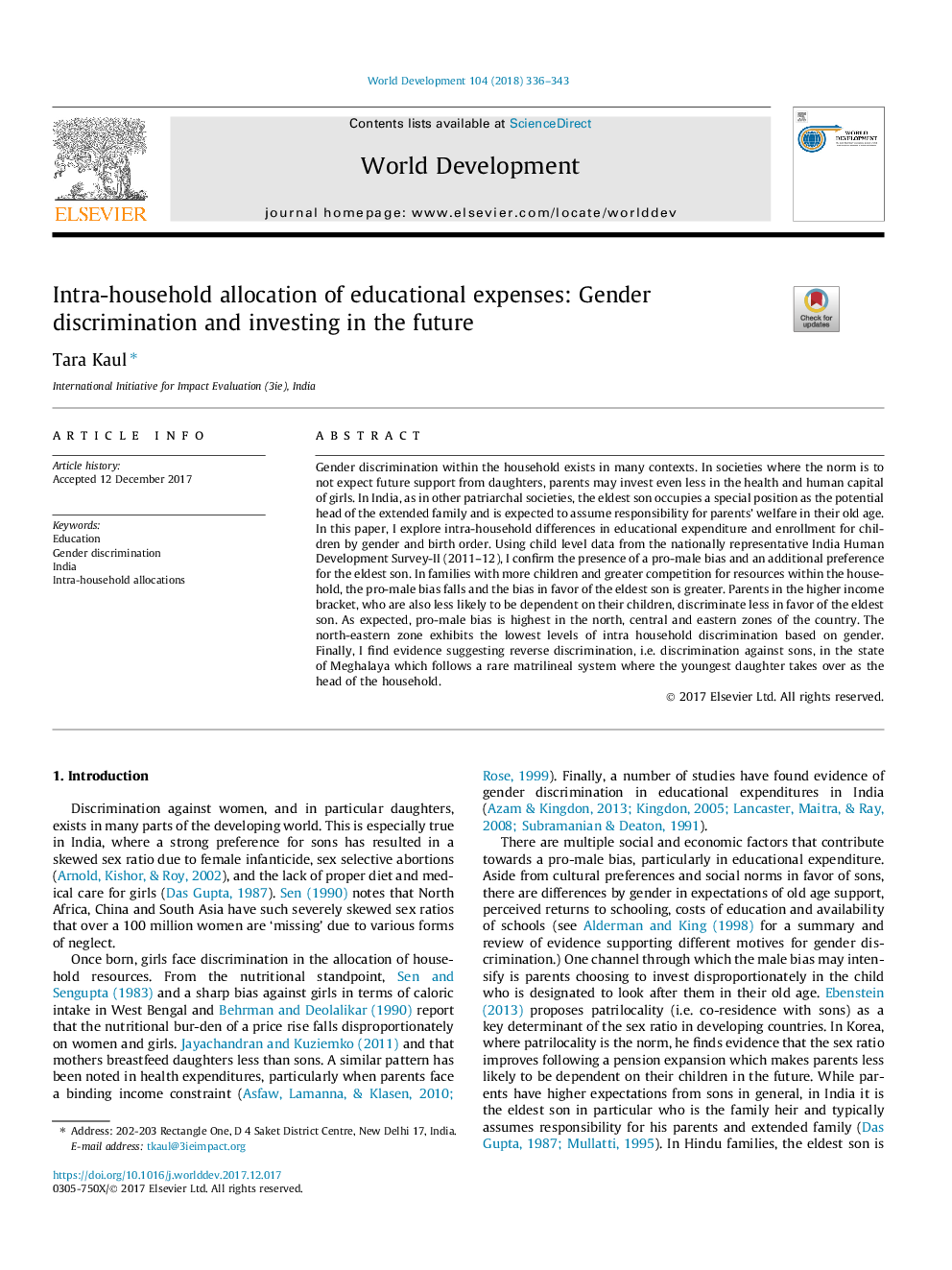| کد مقاله | کد نشریه | سال انتشار | مقاله انگلیسی | نسخه تمام متن |
|---|---|---|---|---|
| 7392179 | 1481114 | 2018 | 8 صفحه PDF | دانلود رایگان |
عنوان انگلیسی مقاله ISI
Intra-household allocation of educational expenses: Gender discrimination and investing in the future
ترجمه فارسی عنوان
تخصیص درآمد های آموزشی درونی خانوار: تبعیض جنسیتی و سرمایه گذاری در آینده
دانلود مقاله + سفارش ترجمه
دانلود مقاله ISI انگلیسی
رایگان برای ایرانیان
کلمات کلیدی
تحصیلات، تبعیض جنسیتی، هند، تخصیص درون خانواده،
ترجمه چکیده
تبعیض جنسیتی در خانه در بسیاری از زمینه ها وجود دارد. در جوامعی که در آن هنجار بودن انتظار پشتیبانی از دختران از آینده نیست، والدین ممکن است حتی کمتر در میزان سرمایه و سلامت دختران سرمایه گذاری کنند. در هند، مانند سایر جوامع پدرسالار، پسران ارشد موقعیت خاصی را به عنوان سرپرست بالقوه خانواده گسترده اش به عهده می گیرند و انتظار می رود مسئولیت رفاه والدین در سن آنها را به عهده بگیرند. در این مقاله، من در میان خانواده تفاوت در هزینه های آموزشی و ثبت نام برای کودکان را بر اساس جنسیت و قانون تولد. با استفاده از داده های سطح کودک از نماینده ملی انستیتوت توسعه انسانی هند (2011-12)، من یک حضور منفی طرفدار مرد و یکی دیگر از اولویت های فرزند ارشد را تایید می کنم. در خانواده های دارای فرزندان بیشتر و رقابت بیشتر برای منابع درون خانواده، تعصب طرفدار مرد افتاده است و تعصب به نفع پسر بزرگتر بیشتر است. والدین در محدوده درآمد بالاتری، که نیز کمتر وابسته به فرزندان خود هستند، کمتر به نفع پسر بزرگتر تبعیض می کنند. همانطور که انتظار می رود، تعصب طرفدار مرد در مناطق شمالی، مرکزی و شرقی کشور بالاتر است. منطقه شمال خاوری، پایین ترین سطح تبعیض درون خانواده را بر اساس جنسیت نشان می دهد. سرانجام، شواهدی وجود دارد که نشان می دهد تبعیض معکوس، یعنی تبعیض علیه پسران، در ایالت مگالایا که در پی یک نظام ماتریالی نادر است که جوان ترین دختر به عنوان سرپرست خانوار به سر می برد.
موضوعات مرتبط
علوم انسانی و اجتماعی
اقتصاد، اقتصادسنجی و امور مالی
اقتصاد و اقتصادسنجی
چکیده انگلیسی
Gender discrimination within the household exists in many contexts. In societies where the norm is to not expect future support from daughters, parents may invest even less in the health and human capital of girls. In India, as in other patriarchal societies, the eldest son occupies a special position as the potential head of the extended family and is expected to assume responsibility for parents' welfare in their old age. In this paper, I explore intra-household differences in educational expenditure and enrollment for children by gender and birth order. Using child level data from the nationally representative India Human Development Survey-II (2011-12), I confirm the presence of a pro-male bias and an additional preference for the eldest son. In families with more children and greater competition for resources within the household, the pro-male bias falls and the bias in favor of the eldest son is greater. Parents in the higher income bracket, who are also less likely to be dependent on their children, discriminate less in favor of the eldest son. As expected, pro-male bias is highest in the north, central and eastern zones of the country. The north-eastern zone exhibits the lowest levels of intra household discrimination based on gender. Finally, I find evidence suggesting reverse discrimination, i.e. discrimination against sons, in the state of Meghalaya which follows a rare matrilineal system where the youngest daughter takes over as the head of the household.
ناشر
Database: Elsevier - ScienceDirect (ساینس دایرکت)
Journal: World Development - Volume 104, April 2018, Pages 336-343
Journal: World Development - Volume 104, April 2018, Pages 336-343
نویسندگان
Tara Kaul,
